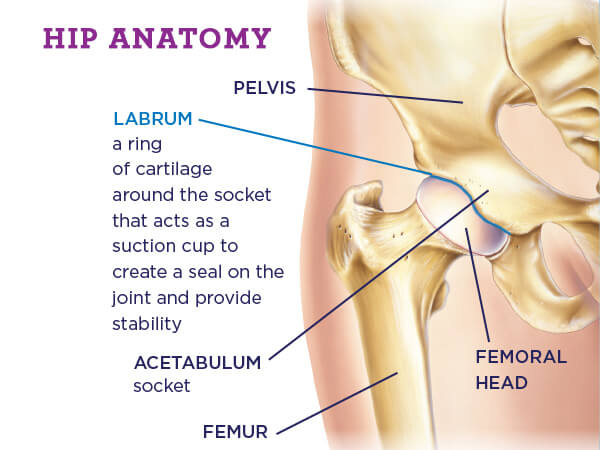What is a Labral Tear?
A Labral tear is an injury to the labrum, the soft tissue that covers the acetabulum (socket) of the hip. The labrum helps keep the femoral head (ball) in place and allows smooth movement when walking or running. It also acts as a seal, so that ball and socket do not touch each other.
Causes and Symptoms of Labral Tears
Labral tears can be caused by many things, including structural issues like femoroacetabular impingement (FAI), trauma from sports injuries, general wear and tear, or a combination thereof. Symptoms of labral tears include hip pain or stiffness, pain in the groin or buttocks area, a clicking or locking sound in the hip and feeling unsteady on one’s feet.
Diagnosis and Tests
A labral tear is typically diagnosed through a physical examination to assess movement and any associated pain. Imaging tests such as X-rays and Magnetic Resonance Imaging (MRI) scans can also help diagnose labral tears by detecting issues with femoral head fitment into the socket which may lead to labral tears over time.
Management and Treatment
Labral Tears don’t heal on their own, but rest, anti-inflammatory medications, corticosteroid injections and physical therapy — where specific exercises are used to stretch and strengthen the hip muscles — can help ease pain. In many cases, surgery may be required to repair labral tears to relieve pain and return function to a relatively normal level. Minimally invasive hip arthroscopy is the procedure most commonly used to repair labral tears. Small incisions are made in the hip and miniature instruments are used to make repairs such as repairing the tear, resurfacing bones to fit into the socket better, or stitching other tissues back together.
How well an individual recovers from labral tears depends on how it was treated. Conservative (non-surgical) therapies can reduce pain but not fix the tear itself; arthroscopic surgery usually results in full recovery within four to six months and allows for a return to previous athletic pursuits and physical activity. If hip or groin pain doesn’t go away after a few weeks, it is important to seek medical advice from an orthopedic hip arthroscopy specialist. Labral tears can get worse and significantly impact your quality of life, so seeking professional help is recommended when these pains persist.







